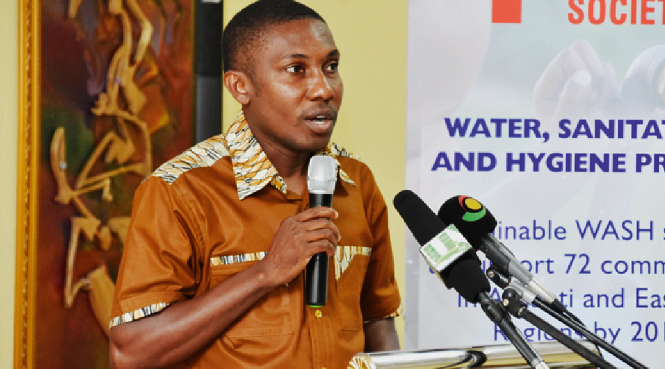
WASH project for three districts launched in Kumasi
A four-year project to provide 75 communities in three districts in the Ashanti and Eastern regions with Water, Sanitation and Hygiene (WASH) facilities has been launched in Kumasi.
The project is targeting 50,000 people with health and hygiene promotion activities, 35,600 people with sanitation infrastructure, 45,600 others with water supply facilities and 1,300 with capacity building in project management skills, including social mobilisation, operations and maintenance of water and sanitation infrastructure in beneficiary communities and schools.
It is being financed by Nestlé Ghana Limited with the Ghana Red Cross Society, as the implementing agency with support from other stakeholders such as the Ghana Health Service (GHS), the Ghana Education Service (GES), the Ministry of Local Government and Rural Development (MLGRD) and the Rural Water and Sanitation agencies.
The partnership is in accordance with Nestlé Ghana’s Creating Shared Value (CSV) module, which aims at giving back to the society where it operates through the provision of social amenities and services.
Water and sanitation
At the launch, the Corporate Communication and Public Affairs Manager of Nestlé Ghana, Mr Aaron Fenu, said the company was implementing the project in Ghana after a successful pilot in some cocoa growing communities in Cote d’Ivoire.
Mr Fenu said the programme formed part of the company’s Nestlé Cocoa Plan, designed to ensure that communities, especially where cocoa is grown were more resilient and sustainable in their day-to-day activities.
The Nestlé Cocoa Plan, he said, sought to increase its suppliers’ profitability, secure high-quality cocoa for its business, and address supply-chain issues such as child labour, gender inequality and poor social conditions.
In a speech read on his behalf, the Ashanti Regional Minister, Mr John Alexander Ackon, said ensuring good sanitation in communities was a collective responsibility.
He said Ghana alone recorded 4,000 children dying from poor hygiene-related diseases each year, a situation which is so alarming that, “as a country, we should do everything possible to do away with this menace that is killing our future leaders.”
Basic needs
Mr Abel Augustinio of the IFRC, in a remark, said sanitation and potable water facilities, which were basic needs of every society was very crucial to human dignity and vital to development.
He said diseases could be prevented with simple investments in the provision of clean water and the promotion of hand-washing by individuals.
The Ashanti Regional Deputy Director of Health, GHS, Mr Awudzi Yeboah, in an address, said more would be achieved in the areas of water and sanitation, if stakeholders collaborated in their efforts.
The Otumfuo Dawurobohene, Nana Kofi Poku, pledged the readiness of the traditional council to support the water and sanitation agenda.
He proposed the construction of household toilet facilities for communities instead of public toilets, and said individual facilities gave people a sense of ownership.
Mrs Bridget Boham-Adday, the Eastern Regional Chairperson of the Ghana Red Cross Society, who launched the project in the Ashanti Region, called on beneficiary communities to ensure that they owned the project.
